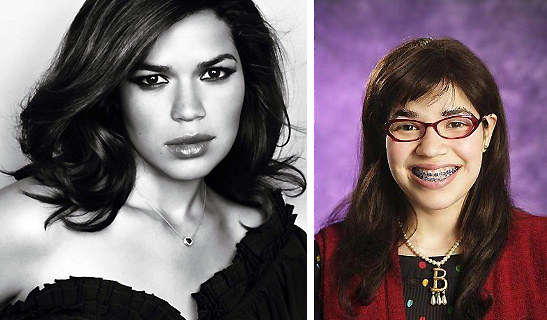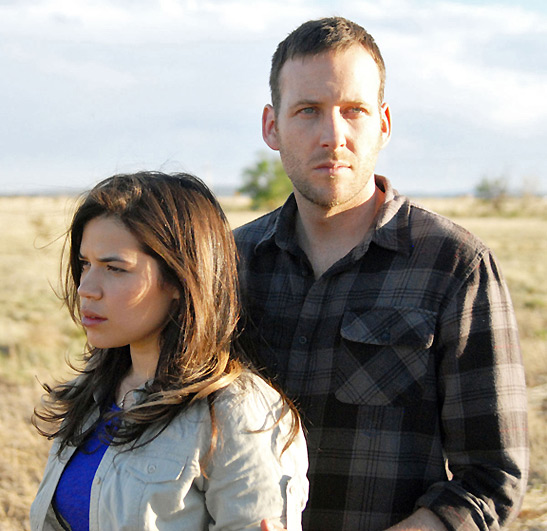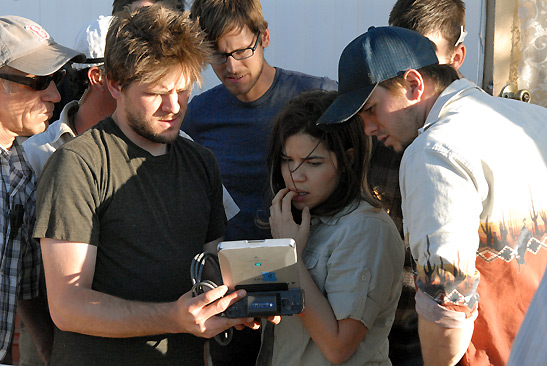 |
 |
|
 |

|
EDITORíS NOTE: This interview originally appeared in the Santa Monica Mirror and the edited version is being reprinted as a courtesy of that publication.
A Moment With America
Ferrera
Q: What was the purpose of your visit to Iraq? Ferrera: We didn't screen the film, but talked a lot about it with the solders and in some cases showed a trailer so they'd have an idea of what the film was about. We were mainly there to meet and greet. Q: Ryan gave us his take on screening the film for soldiers. What was your reaction to the screening? Ferrera: Ryan's vision was to tell a story that was authentic - a story that a soldier or a soldier's family member could sit and watch and say 'yes, that's true, that feels real to me.' We screened the movie at Fort Carson for approximately 600 - 700 soldiers on active duty and their spouses. These troops had just returned from Iraq or Afghanistan or were shipping out in a week. The response was amazing and sparked really interesting one-on-one discussions about their versions of the story. Q: What do you hope to accomplish? Ferrera: Our goal was to relate to the soldiers and their families and to stimulate conversation. We hoped they would feel that it was a non-judgmental, compassionate portrayal and not a politically skewed film with a certain agenda. Q: Was this the most emotionally challenging role for you? Ferrera: (Pause) That's an interesting question. I don't think I can really compare it to anything else I've done because every role I take on is a challenge. I would say that this is probably the most grown-up role that I've gotten to play. It's clearly the most timely and serious role because it has such an immediate resonance to what's happening in our society. It was challenging, but in some ways I felt like I could relate to Sarah more than some other characters I've played. Q: How so? Ferrera: Because I'm not a woman who has a husband at war, I had to connect to this character on a human level and try to understand her journey outside of the military context. She has a partner in life who comes home and is inaccessible behind his eyes. How do you get him back? How do you find that person that was supposed to be there forever? That felt like an easier thing to relate to than how would I feel if my husband went off to war.
Q: Because of your special relationship with the writer/director Ryan Piers Williams, and your role as executive producer, you were probably involved with the development of the character of Sarah from the beginning. Did that give you a different perspective on her? Ferrera: Originally I was only going to be the executive producer and didn't have any intentions of playing Sarah. I offered the role to many of our friends hoping they would attach themselves to the project and help us get it made. As the executive producer I had to look at the picture as a whole and to think about the role of each character. Ryan and I had many conversations and discussed every character in depth. He wanted the actors to do their homework and to feel an obligation to making this authentic and not act as a Hollywood actor. This gave me deep perspective so when I decided to play Sarah, I could then stay fully focused on just her. Q: How did the military's cooperation help you prepare for the role? Ferrera: They literally handed us phone numbers of women from different parts of the country who were willing to talk to me. We had very open and candid conversations, some of which started out a little tentative, but by the end, their stories would pour out of them. They're a whole other side of the coin because we focus on the soldiers and not on the family members and spouses who sacrifice so much and live in constant fear that their loves ones are in imminent danger. I heard stories where it ended in the worst-case scenario and others where it ended in the best-case scenario where a soldier admitted he needed help which saved the marriage. Sadly, more times than not, it went in the other direction. Oftentimes the wife feels guilty because she doesn't know how to heal her husband, but before he can be healed, he has to ask for help. But at a certain point when is it PTSD and when is it domestic violence and the wife is in danger? Q: What was the main thing you discovered in talking to these women? Ferrera: They feel invisible. It's all about concern for the soldiers. One thing I'll never forget is what one woman whose husband has PTSD said to me: 'I allowed myself the thought of would it have been easier if he didn't come home.' That's incredibly heartbreaking because we, as the outsiders, think they come home and they're safe and there's a happy ending. But the truth is when they return, they are actually fighting a second war. Q: What was the most difficult scene to shoot? Ferrera: There were a lot of difficult scenes, but I think for me it was the bathroom scene where Sarah is trying to connect to James on all sorts of levels, including sexual, but nothing is working and she's left wondering if she can win this battle to find what used to be her husband.
Q: You showed this film at the Edinburgh Film Festival and it won Best International Feature. Did the Q & A's differ from when you showed it to a military audience? Ferrera: The Q & A's after the screening were just as reactive and responsive. In Scotland alone, they're having a problem with the huge percentage of incarcerated men who are returned vets. Clearly we have to deal with this at home, but it's a conversation that's global. We train men to fight, but then how do we reenter them into society. Q: Will you be doing any volunteer work with returning vets? Ferrera: Our biggest hope is to show the film on military bases around the U.S. to stimulate conversation. As a companion to that we are screening the film for civilian audiences with the hopes that bridges will be built and communities become inspired to help. Whether we agree with the wars or not, we owe it to our returning troops to help them assimilate back into civilian life and to give hope to their families. Q: Best of luck with your film. Ferrera: Thank you very much. |
|
Thanks so much for those lovely tourism photos, especially of Ireland. I certainly enjoyed all the places you suggested, and am working towards my next vacation. Don’t forget Cuba. That’s an exciting place. Rosalie, Los Angeles
Enjoyed your article on Mira Sorvino. Such an interesting background – family, education, career and now human rights activist. I'm not a gossip mag fan so getting more meaty news about movie celebrities from you gives me hope that there are some inteligent life forms in Hollywood. Peter Paul, Pasadena, CA
Thank you, Bev. This reminded me to go see the movie, "An Education," which I had already almost forgotten about, having seen the preview a few weeks ago. I enjoy this actress quite a bit--she has a uniqueness about her and she pulls me in. I enjoyed this. Sandeee, Seattle, WA
Thank you Beverly,I really enjoyed reading about your intimate conversation with Forest, of whom I am a great admirer. I look forward to seeing the film "Our Family Wedding." Yoka, Westlake Village, CA
Thank you for the sending me the beautiful article you wrote about Ireland. We will use your recomendations for hotels in the Southern part. We plan to also go to Dublin and some other Northern cities so I will get some recommendations for these from others. After reading your article, I am getting more excited about going. I think we will be in Ireland for 8 days altogether. Leah Mendelsohn, Santa Monica, CA
Very much enjoyed Ms. Cohn's article about Munich, especially the visuals. Though it has been 25 years since my last visit, the piece brought back countless pleasant memories of the city and the people!! Many thanks. Lawrence, Los Angeles * * * Marianplatz and that general area is truly one of the best Christmas celebrations in the world. Between that and Oktoberfest (which I can only imagine) Munich is one of the greatest cities in the world for major annual events. Christopher Dale, New York, NY
Hi Bev, you have done some wonderful pieces on some great celebs...Great work. The travel articles are just wonderful too. Scott Mueller, Huntington Beach, CA
Your great Zurich article makes me want to go there for the holidays! I love the photos, too, especially the ones of you in the sleigh, the view over the houses and the zoo! Anna Marie, Santa Monica, CA * * * Lovely article! As a European, and having been to Zurich (albeit in summer) I can vouch for this lovely city. Great pictures, too! Helene Robins, Santa Monica, CA
Hi Bev, Nice review, nice seeing you, nice website interface "...Talk to Bev" - Enjoy your Thanksgiving! Richard D. Kaye, Marina del Rey, CA
Hi Bev, Your interview with John Cusack is very interesting. I always wondered why these actors/actresses always get top billing when really, if you think about it, the real work come from the animators, writers and tech whizzes who spend far more hours on the movie than those actors. I know, I know, it's the all about marketing. The names of these actors are what bring in the big bucks. Still, I think these actors are way overpaid for the "little" that they do. I remember that once upon a time, the early animation classics never mentioned the voices behind the characters. I think it was only later when Walt Disney tapped into the voices of known celebrities like Walter Matthau in the Jungle Book or Zsa Zsa Gabor in The Rescuers that the voices became a marketing magnet. Keep up the good work. I enjoy your interviews as you peer into the lives of the Hollywood celebrities. Peter Paul of South Pasadena, CA
|
This site is designed and maintained by WYNK Marketing. Send all technical issues to: support@wynkmarketing.com

|














